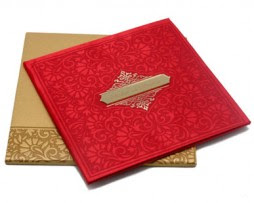Grammatical Mistakes You cannot Afford to make in Your Wedding Cards
Grammatical Mistakes You cannot Afford to make in Your Wedding Cards
There’s nothing quite like the excitement of ordering your wedding cards and waiting for the moment when you hold it in your hands. You imagine your guests oohing and aahing at the beautiful designs and the sentimental words adorning your wedding card. But sometimes a grammatical error here and there spoils the emotions that you wish to evoke from the guests. To avoid ruining your well-thought wedding card, you will need to steer clear of the silly grammatical mistakes that might otherwise act as a sore eye to the ornately strung words.
If you want to have an immaculate wedding card that serves as a model for its descendants, start with the grammar. Nothing spoils the essence of your wedding card like bad grammar. Even though you may be well-versed in English, we often tend to overlook the small, unintentional mistakes when proofreading it. Therefore, instead of proofreading it by yourself, it is better to have a minimum of four to six new pairs of eyes. Ask your close friends and relatives to read the wedding card for you as a guest and see what they immediately spot. You would be surprised at the errors people can spot when they sit down to especially spot the errors! There are a few common grammatical mistakes which you can keep in your mind when checking your wedding cards and here are some of those for you to start with.
Keep a wary eye on the capitalization:
It is understandable to have a need to capitalize many words in your wedding card that might not be necessary. Keep in mind that capitalizing the first letter in a sentence is often sufficient save the few other instances when a hotel name or a locality name is being mentioned. Don’t go with the urge of capitalizing every word that you think is important. Instead, use a different colour or quotations to highlight the words that you need to bring to the spotlight.
Fiancé and Fiancée:
This is another common mistake that many inadvertently make. Fiancé, the word with a single ‘e’, is used to denote a man who is engaged and is about to get married and Fiancée with the two ‘e’ denotes a woman who is engaged and is soon going to be married. Though both are pronounced the same way, you should be careful in the context you are going to use these.
RSVP:
RSVP is one of the common words that you can see in almost all the wedding cards but there is a common error going around in the wedding invitations when using the word ‘RSVP’ in it. RSVP is the short form of the French phrase “répondez, s’il vous plaît,” which means ‘Please reply’. Therefore, when using sentences like ‘Please RSVP before September’, the word ‘please’ becomes redundant. Be careful when using RSVP in a sentence or you can use simple phrases like, ‘Kindly respond’, ‘Kindly reply’ in place of RSVP or just use RSVP as a heading rather in a sentence if it confuses you.
The errors with the year:
When you have chosen to spell out the wedding year, make sure that it is all in small cases (two thousand nineteen) unless you are using the year at the start of a sentence in which case, only the first letter needs to be capitalized. Some make the mistake of going all capitals with the year (Two Thousand Nineteen) which isn’t the right form of using capitalization. Also, when you spell out the year in words, there is no need to add an ‘and’ in between the words (two thousand and nineteen). Make sure to check if the date of the wedding coincides with the day you have mentioned.
Improper abbreviations:
It is better to refrain from using abbreviations in your wedding card. There are a lot of instances where couples go wrong with the use of abbreviations and there is also the probability that some may not be familiar with it. So, it is better to go with the expanded forms to avoid ambiguity and be straightforward and clear with the words that use in the wedding cards.









Comments
Post a Comment